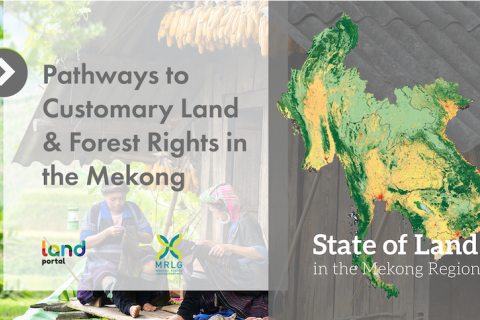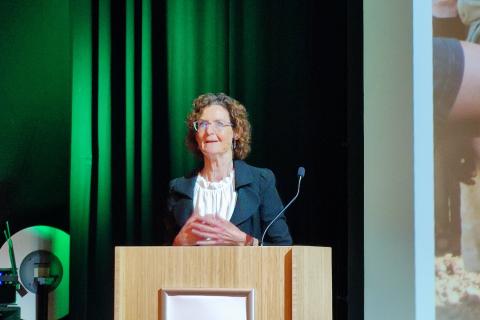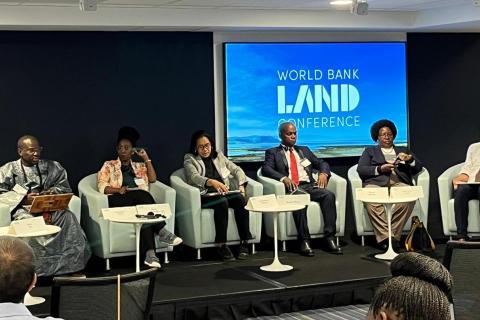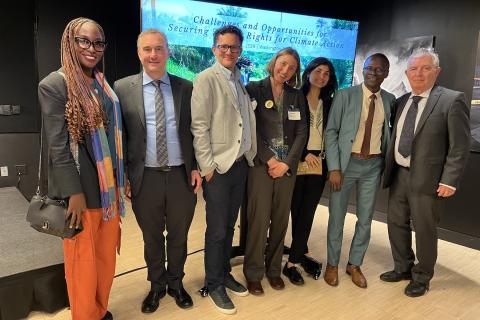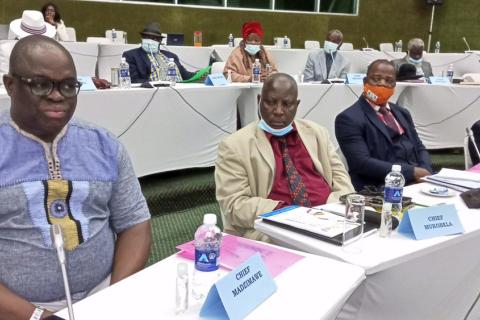Keynote Speech from Bram Büscher: Deepening Social Justice
Speaking truth to power is an art, but increasingly a lost art. This goes as much for academia as for the rest of the world. Indeed and unfortunately, much of academia reflects the world in which it functions and often makes the challenge of deepening social justice harder rather than smaller. To put it bluntly, much of academia has resorted to instrumental and naïve beliefs in innovation, technology and efficiency (which dominate the natural sciences) or (as in much of the social-economic sciences) increasingly arcane niche debates that too often revolve around virtue-signalling, methodological-theoretical wizardry or apolitical pragmatism. What we seem to have lost to a good degree – though to be sure: it was never a dominant endeavour and at the same time it has never been absent either – is the art of speaking truth to power.
Keynote Speech by Frances Cleaver at the IoS Fair Transitions - LANDac Conference & Summit
I would like to make an argument that in aiming to deepen social justice in green transformations, we should pay renewed attention to the institutions of collective action at a very local level. I'm talking about peasant associations, irrigation groups, women's groups, indigenous people’s groups, producer associations, the local committees that manage land, water, forests.
The Land Portal listens: How your feedback shapes the future
We often ask for feedback from you. Knowing this takes time, effort, and thought, we are grateful that so many of you do it. We want you to know that we read and hear every single person’s comments. We implement a fairly dynamic feedback loop, but just in case you have wondered how Land Portal uses data and users’ feedback to make a real difference, here is a comprehensive look at our rigorous and participatory monitoring and evaluation (M&E) system. This blog is taken from our 2023 Annual M&E Report, which dives deep into how we collect and analyze data and user feedback to drive impactful initiatives for better land governance.
World Bank Land Conference Panels Recap
After a four-year hiatus, the World Bank Land Conference took place again in Washington, D.C. this May, convening one thousand government, civil society, and land stakeholders in person and thousands more online. The theme of the 2024 conference was "Securing Land Tenure and Access for Climate Action," an exciting and meaningful frame for discussing an issue near to our hearts – open access to land information.
The Land Portal organized a panel on building a robust and open land information infrastructure for tenure security and climate action in Africa, moderated by Romy Sato. The session featured an outstanding panel of speakers from the public and private sectors representing perspectives on land data from Malawi, Madagascar, Mozambique, Namibia, Senegal, and Uganda.
Team reflections from the World Bank Land Conference 2024
After a four-year hiatus, the World Bank Land Conference took place again in Washington, D.C. this May, convening one thousand government, civil society, and land stakeholders in person and thousands more online. The theme of the 2024 conference was "Securing Land Tenure and Access for Climate Action," an exciting and meaningful frame for discussing an issue near to our hearts – open access to land information.
"Pandemic was the turning point" on stimulating healthy and fruitful debate on land issues
Celebrating Fifteen Years of Open: The Land Portal’s Journey to Creating Communities of Practice
Since its beginnings, the Land Portal has been founded in a spirit of openness and, with one of its primary goals being providing wide access to land governance information. The Land Portal, however, was created at a time where the opportunities to inform and open up the debate on land issues and thinking around the importance of open land data were much more limited. When I first came to know of the Land Portal’s work, long before I joined the team, social media was still very much in its infancy, the open data movement was just taking off and technology was only beginning to become personal and portable. These significant changes would eventually lead to a world in which technology touches nearly everything we do, considerably changing the nature of the Land Portal’s work.
Unlocking the Power of Open Data for Climate Action
Imagine a world where every community has the data, information and knowledge it needs to make informed decisions about the land they call home. A world where the power of information is harnessed to hold leaders accountable for managing essential natural resources sustainably. This is the transformative potential of open and accessible land data in the fight against climate change, which is the defining challenge of our time, threatening the lives and livelihoods of communities worldwide.
The historical roots of the Land Portal
In the early 1990s, in 1993 to be precise, perhaps wanting to emulate the concept of the "End of History" promoted by Francis Fukuyama, the U.S. government, thinking that with the dissolution of the Soviet Union the agrarian issue was disappearing from the international agenda, requested the FAO to eliminate the Agrarian Reform Service, of which I was a member.
Webinar Recap: Insights and Stories on the Impact of Land Corruption on Discriminated Groups in Africa
The Land Portal Foundation, in partnership with Transparency International, hosted the webinar titled "Breaking New Ground: Insights and Stories on the Impact of Land Corruption on Discriminated Groups in Africa." The webinar brought together a panel of distinguished experts to delve into the challenges and complexities of corruption intertwined with discrimination in land rights and governance. This session provided crucial insights through detailed case studies and expert analyses, offering pathways towards more equitable land management practices.
Terminology: Majority World or Global South?
We appreciated all of the people who took the time to leave comments, write emails, and take the poll. We heard you, and based on what we heard, we won’t be making any wholesale changes right now in how we refer to countries and regions that have historically been left out of economic and industrialized development. We are particularly sensitive to the idea that the term Majority World could, as Rafael wrote, “perpetuate a notion that could undermine the importance of minority groups. It appears to replicate the very idea that the worth or relevance of a group is tied to its size, which is a concept many of us are striving to move away from, especially those of us engaged in addressing the vulnerabilities of minority populations.”
Traditional authorities need a clearer role in land governance
Traditional authorities in Zambia complain that the government does not consult them when land is allocated for investment projects, while communities say chiefs are neglecting their interests. Jesinta Kunda of Zambia Land Alliance says more clarity is needed on the role of traditional authorities, in law and practice, to ensure large-scale investments in agriculture, mining and other sectors are governed better – particularly in light of the rising demand for critical minerals found in Zambia. She urges the government, traditional leaders and citizens to seize the opportunities presented by current legal reforms in Zambia to create change.

